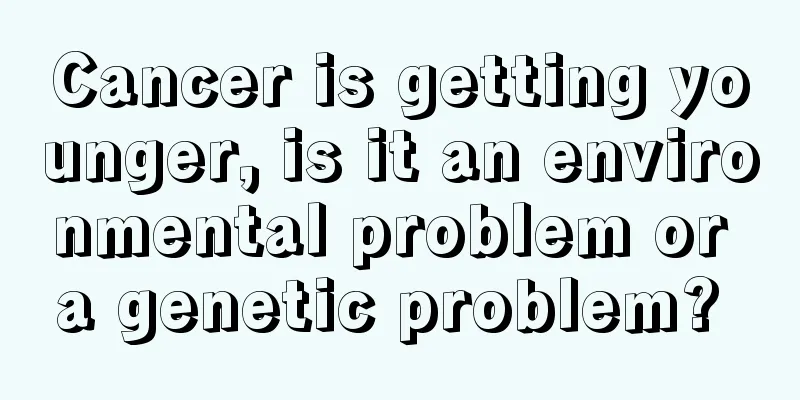Cancer is getting younger, is it an environmental problem or a genetic problem?

|
Cancer is not formed in a short period of time. It takes a fairly long process, from a dozen years at least to several decades at most. This means that it takes many years from the time you are exposed to a carcinogenic factor to the actual formation of a diagnosable cancer. This is why most cancer patients are middle-aged and elderly people. Take smoking as an example. Smoking is not carcinogenic and you will get lung cancer after smoking a few cigarettes or a few months. The most risky time is after smoking for twenty years (a pack of cigarettes a day, or twenty cigarettes, for twenty years, the so-called smoking index is 200 cigarettes a year). If you started smoking in your teens, you would be almost forty years old. If you started smoking in your twenties, you would be in your forties or fifties. If a person of a few years old gets lung cancer, it certainly cannot be attributed to smoking. So, does cancer only strike middle-aged and elderly people, not young people? Of course not! The causes of cancer are very complex and involve many factors. In fact, cancer also affects young people, but young people are less likely to suffer from cancer than middle-aged and elderly people. In recent years, the incidence of cancer has indeed tended to be younger, and the age of cancer onset is getting lighter. What is the reason for this? Is it an environmental problem or a genetic problem? This needs to be analyzed in detail. 1. When young people develop gastric cancer, genetic factors must be considered, and the younger they are when they develop cancer, the more they should consider the possibility of genetics. Environmental factors, including dietary factors, cause cancer, which requires a fairly long process, and it is not possible to form cancer in a few months or years. Of course, this does not completely exclude environmental factors, but the younger you are, the more you should consider genetic factors, and not attribute it to environmental factors, although environmental factors may also be one of the factors or one of the inducements. So how to determine whether it is genetically related? This requires asking about family history. Family history of blood relatives, especially direct blood relatives, whether anyone has cancer, how many people have cancer, and what kind of cancer they have, this is of great reference value for judgment. Generally speaking, the more direct blood relatives have cancer, the younger they are when they develop cancer, especially if they suffer from cancers such as breast cancer, ovarian cancer, endometrial cancer, colon cancer, etc., then the possibility of family genetics is greater. In addition, necessary genetic testing should be combined to make a judgment. 2. In addition to genetic factors, environmental factors must also be considered. As mentioned earlier, the younger you are, the more you need to consider genetic factors, but this does not mean that environmental factors are excluded. When we say that cancer is getting younger, we do not mean that people are only a few years old, but that the overall age of cancer is tending to be younger. For example, the age of cancer is moving forward, and people in their twenties and thirties are getting cancer. These people did not originally have a high risk, but now it seems that more people in this age group are getting cancer. For people in their twenties and thirties who develop cancer, although genetic factors are more important than those in the middle-aged and elderly, the proportion of environmental factors is still significantly greater than that of people who are only a few years old or in their teens. An important factor in environmental carcinogenesis is time. For example, smoking does not mean that you are prone to cancer after smoking for only one or two years. The younger age of cancer may be due to environmental issues or genetic factors. It depends on the specific circumstances. |
<<: If I have a brain tumor, will there be any side effects from chemotherapy?
Recommend
There are red bloodshot on the cheeks
The appearance of red blood streaks is related to...
What should I do if my nails grow into my flesh? How to deal with nails growing into my flesh
Many people have experienced this situation, wher...
What is the reason for high alanine aminotransferase
When human health problems occur, the body underg...
Precautions for using fire extinguishers
Fire extinguishers should be available in all pub...
Are plastic cutting boards safe?
In daily life, cutting boards are made of both wo...
Is disinfection required for skin test?
Taking medicine and getting injections are basic ...
What are the treatments for hereditary non-polyposis colorectal cancer
What are the treatments for hereditary non-polypo...
What is the correct way to use headphones?
With the continuous advancement of electronic tec...
Why does colon cancer cause pain in the late stage?
Why does colon cancer cause pain in the late stag...
Bladder cancer patients usually experience frequent urination and urgency
Bladder cancer patients usually experience freque...
Function of Weizhong acupoint
In fact, when treating diseases, Chinese medicine...
Why is the tongue coating white?
The tongue is the most important part of our body...
Is it good to sleep lying down
When it comes to sleeping, everyone may have thei...
Principle of braces correction
Wire braces are a surgical care method that must ...
How to relieve study pressure, there are 5 methods
Students are under very tight schedules and great...









